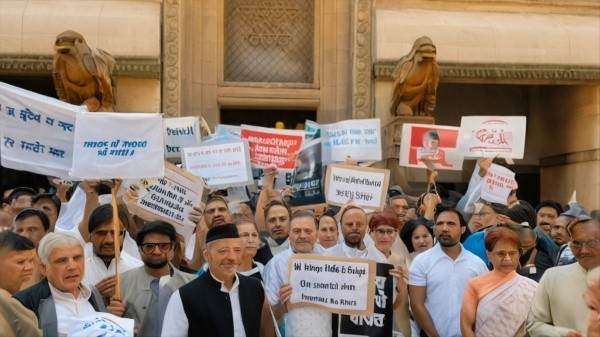Iran’s Plan to Strike Back Against the U.S.
Iran’s Military Preparations Following U.S. Attacks
Loading...

The Narendra Modi-led government has been accused of unfairly allocating funding to states, favoring those ruled by allies
Tensions have flared in India as the opposition has taken a stand against the federal budget presented by the Narendra Modi-led government, claiming it unfairly favors states governed by the ruling party and its allies. The budget, tabled in the Parliament, has sparked accusations of discrimination against opposition-ruled states, prompting protests and heated debates.
The opposition has raised concerns over what they perceive as preferential treatment given to states governed by Modi’s Bharatiya Janata Party (BJP) and its allies in the National Democratic Alliance (NDA), who played a crucial role in forming the government after the BJP failed to secure a parliamentary majority on its own. The NDA secured 293 seats in the 543-member lower house of parliament (Lok Sabha) during the recent elections, while the opposition INDIA bloc, led by the Indian National Congress, secured over 200 seats, defying initial predictions.
Rahul Gandhi, a prominent figure in the Congress party, criticized the budget as a “kursi bacho” (saving the seat of power) budget, alleging that it was designed to appease coalition allies at the expense of other states. He also accused Modi’s party of plagiarizing Congress’ manifesto and previous budgets, intensifying the opposition's discontent with the budget's allocations.
Finance Minister Nirmala Sitharaman, who presented the budget, outlined substantial financial provisions for two states, Bihar and Andhra Pradesh, which are governed by the Janata Dal United (JDU) party and the Telugu Desam Party (TDP) – key allies in the NDA bloc. The budget allocated over 410 billion rupees ($5 billion) for various monetary aid and infrastructure development projects in these states, with Andhra Pradesh set to receive 150 billion rupees for the construction of its new capital, Amravati, a long-standing project championed by the state’s Chief Minister Chandrababu Naidu. Bihar, on the other hand, is slated for the development of expressways and a power plant.
Emphasizing employment, skill development, support for small businesses, and the middle class, Sitharaman highlighted the budget's focus on welfare schemes aimed at alleviating rural distress and bolstering the rural economy. In a bid to address high youth unemployment, the government announced five new schemes with an investment outlay of 2 trillion rupees ($24 billion), intended to create employment opportunities and skill development for 41 million individuals over a five-year period.
Interestingly, the need to generate employment for the youth was a key promise in the election manifesto of India’s opposition Congress Party during the recent general elections. In a further act of protest, the Congress party announced that the chief ministers of the states under its governance – including Karnataka, Telangana, and Himachal Pradesh – would boycott a crucial meeting of the government think tank NITI Aayog’s council, which was scheduled to be chaired by Modi later in the week.
The opposition's outcry against the budget reflects the deep-rooted political divisions and power struggles in India, setting the stage for a contentious debate over the allocation of resources and the government's economic policies. As protests continue to gain momentum, the nation braces for a period of intense political discourse and potential policy adjustments in response to the opposition's grievances.
BMM - MBA
Iran’s Military Preparations Following U.S. Attacks
Troops remain in five strategic locations, raising fears of renewed tensions and long-term occupation.
Opposition forces have taken control of the capital after a significant offensive. Here is how it unravelled.
